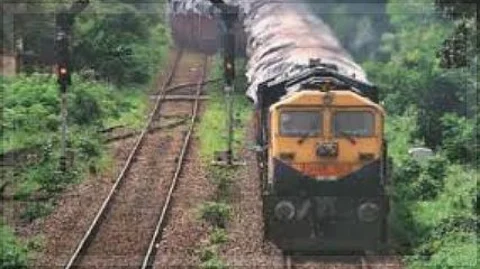

Team Herald
MARGAO: A fresh confrontation erupted on Friday between Railways and residents of Primeirovaddo, Velsao, when Rail Vikas Nigam Limited (RVNL) attempted to construct a retaining wall that would block access to several heritage houses facing the railway tracks. The dispute centers on a strip of land that residents claim as their traditional right of way dating back generations, while Railways asserts ownership through adverse possession.
Tensions escalated when RVNL workers began construction on the approximately 10-meter wide strip of land abutting the railway tracks and heritage houses. When Velsao Sarpanch Maria Diana Gouveia confronted the workers about trespassing on the village Right of Way (RoW), RVNL employees dismissed her objections and continued their work.
The affected residents, armed with Portuguese-era documents (Inscription & Description) issued by the State's Revenue Department, maintain that their property boundaries explicitly mention either the road or railway tracks as their eastern boundary. These documents predate the establishment of the Western India Portuguese Railway (WIPR) in the 1890s, when the contested area served as a road for horse and bullock carriages.
Residents' concerns are heightened by the fact that the disputed land was never formally acquired and lacks a survey number. This latest confrontation mirrors previous tensions in this and neighbouring areas, where similar construction attempts by Railways damaged drainage systems and sparked land ownership disputes. Heritage homeowners face a particularly dire situation, risking being landlocked if the retaining wall construction proceeds.
Locals as well as senior citizens residing in ancestral homes adjacent to the tracks already bear the brunt of existing railway traffic. Their homes show visible structural damage, with cracks spreading across compound walls and into interior spaces like kitchens. The constant vibrations from coal-laden wagons have not only compromised these heritage structures but have severely impacted residents' quality of life.
"We can't get proper sleep at night anymore," shares one elderly resident, describing how the thunderous passage of trains and continuous vibrations have become a daily distress. Coal pieces regularly spill from passing wagons onto their property, further compounding their problems. With the prospect of doubled tracks, residents fear an untenable future. "If one track causes this much damage, imagine what two will do," remarks another elderly resident, voicing concerns about both their ancestral home's structural stability and personal well-being.
"There appears to be no consideration given to the local residents by the Railways. They just come with their JCB and labour force without following due procedure. If we complain, tomorrow they will bring the Railway and Goa police," alleged Goencho Ekvott (GE) Founder Orville Dourado Rodrigues.
"This is not the first time we have contested this work. We have lodged complaints, attended hearings but the government appears to be working for the railways, to facilitate their work, rather than protecting the rights of the residents. We are prepared to approach the courts to fight the work. Once the retaining wall is built, what will happen? The residents will be stuck indoors. This is the only way for their vehicles to come in as well. Unless they are happy that the villagers here are displaced for railway expansion. Do we have a voice in our own state or is it only the railways' work that has to be heard, given that the minister recently said railway projects can't be opposed or stopped?" Rodrigues added further in anger.